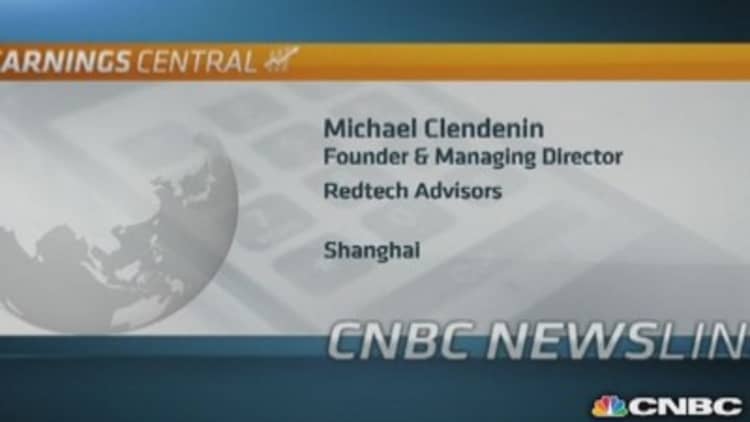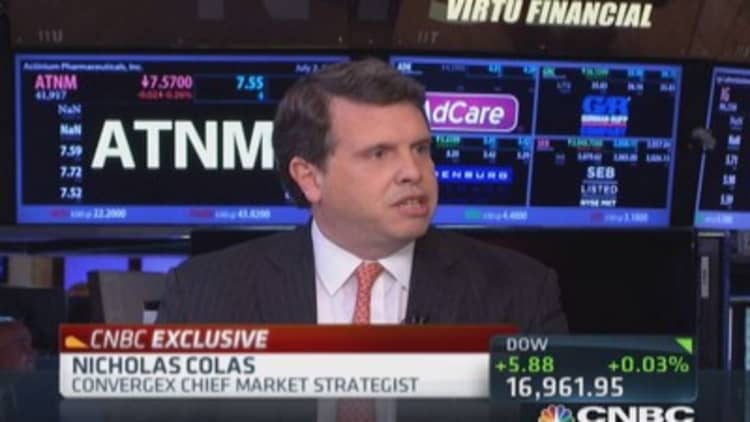Chinese companies have been pouring money into Silicon Valley in the past year, joining a parade of financiers seeking to participate in the latest Internet boom. In a market flush with cash, winning deals isn't easy -- ask any prominent venture capitalist.
So when Alibaba was making its pitch to invest in U.S. video chat start-up Tango late last year, the e-retailer went all in. Among the 22,000 employees it could have sent across the Pacific Ocean, Alibaba chose Joe Tsai, executive vice chairman and second in command.
"We were ecstatic," said Eric Setton, Tango's chief technology officer. In addition to hosting Tsai at Tango's office in Mountain View, California, Setton and his co-founder Uri Raz had dinner with the Alibaba executive at the Four Seasons Hotel in nearby East Palo Alto. Soon after, they hopped on a plane to tour Alibaba's headquarters in Hangzhou, where they had an hourlong sit-down with Executive Chairman Jack Ma. "We got to meet with pretty much every senior executive at Alibaba," Setton said.
As Alibaba marches toward an initial public offering that could value the company at well over $100 billion, Setton knows how important those contacts are going to be. That's a big reason why in March and April, Tango took investments totaling $217 million from Alibaba at a valuation of more than $1 billion.
Read MoreAlibaba IPO survey: In or out?
With 200 million members mostly in the U.S. and Western Europe, Tango now needs to expand across Asia and beyond, pitting it against massive Internet companies including Facebook, which is buying WhatsApp, Line out of Japan and China's Tencent, whose WeChat service is growing rapidly.
While Alibaba is choosing the investment route as its major entree into the U.S. (rather than going head-to-head with Amazon.com in e-commerce), start-ups are asking what the Chinese company can offer in addition to capital, because there's plenty of that—venture investing in the U.S. is at the highest level since the dot-com bubble.
Over the past year, Alibaba has backed six U.S. start-ups in funding rounds that totaled about $1 billion, according to CB Insights.The company has an investing team in Silicon Valley and is opening an office in San Francisco. Its most recent U.S. investment was in ridesharing company Lyft, which pulled in $250 million in April. In its IPO prospectus, Alibaba said its investments have three main purposes: "increasing user acquisition and engagement, improving customer experience, and expanding our products and services."
Alibaba is one of the three big Chinese Internet companies pushing westward. Baidu, Alibaba and Tencent, commonly known as the BAT group, each have so much market share in China that they have to compete on a global stage to maintain their growth.
"The BAT companies have become increasingly aggressive in the U.S.," said Scott Sandell, head of the technology investing practice at venture firm New Enterprise Associates in Menlo Park, California. "They have global ambitions, and one way they see sales expanding overseas is through investments."
Tango has global pursuits of its own. The company's mobile video chat app, which is similar to Skype and Apple's FaceTime, is free. Tango makes money on mobile games and the ads that it can show to gamers playing them. The service works like a social network, because users play against friends and family, which are typically the same people on their chat list.
Tango's biggest challenge is that Shenzhen-based Tencent has $65 billion in annual revenue, a market capitalization of $150 billion and a suite of competitive products. For Tango, partnering with Alibaba is less about cracking China, a market that's notoriously tough for U.S. Web companies and is dominated by Tencent, and more about gaining an ally as it vies for users elsewhere.

"The company that has the best understanding of Tencent other than Tencent is probably Alibaba," Setton said. Beyond that, Setton knows that eventually Tango will have to evolve from an application focused on communication and games to one that also facilitates commerce, so users can view promotions and then buy the items with the click of a button.
"If you think that in the medium to long term that e-commerce might be part of your future, there's no better partner," he said.
Ashley Zandy, an Alibaba spokeswoman, said company executives were unavailable to comment because of the pre-IPO quiet period.
Alibaba presents a different opportunity for ShopRunner. The San Mateo, California-based shopping site raised $202 million from Alibaba in the past year, handing over a 39 percent stake in the start-up. The two companies soon began working on technology that will open the U.S. e-commerce market to Chinese shoppers.
To date, consumers in China looking to buy handbags, shoes and even baby formula from the U.S. have had no easy way to do so. They can go through back channels to have goods shipped in suitcases, with the risk that they'll receive counterfeits, or they can deal with the high delivery prices, extended shipping times and limited inventory from other e-commerce sites.
In the U.S., ShopRunner charges members $79 a year for a service that includes two-day shipping and return shipping from any of the company's retail partners like PetSmart, American Eagle and Ralph Lauren. ShopRunner is now working with Alibaba to enable those same retailers to send goods to Chinese shoppers within 10 days of the order, said Fiona Dias, ShopRunner's chief strategy officer.
Because Alibaba controls the Chinese domestic market, has a massive distribution system and understands all the politics involved, a once impossible task for a U.S. Internet company—particularly a 90-person start-up—becomes feasible. Buyers will also be able to pay with Alipay, the Chinese equivalent of PayPal.

"It's solving the language issue, customs issues, payments issues—many things that need to be solved," Dias said. "Using Alibaba's massive logistics division, shipping costs will be far lower than what normal consumers would find at UPS."
Come this holiday season, Dias expects the complex new system to be up and running for Chinese shoppers.
Alibaba's ability to help ShopRunner in China and bolster Tango and Lyft's offerings elsewhere will likely determine whether it can be a permanent force in Silicon Valley tech investing. Corporate venture groups are often shunned by start-ups because the relationship can make it difficult to do business with rivals, and because, as part of big companies, they tend to be slower to sign the paperwork.
Read MoreLyft's NYC debut delayed
Toshi Otani, a managing director at venture firm TransLink Capital in Palo Alto, says Alibaba is at least bucking the latter trend. TransLink, which backs companies looking to tap Asian markets, co-invested with Alibaba in Tango and app search engine Quixey.
"A lot of strategic investors take a long arduous approach," Otani said. "Alibaba seems to be much more quick and decisive. "If there are enough synergies they can foresee, they tend to invest at a much faster pace."
—By CNBC's Ari Levy


